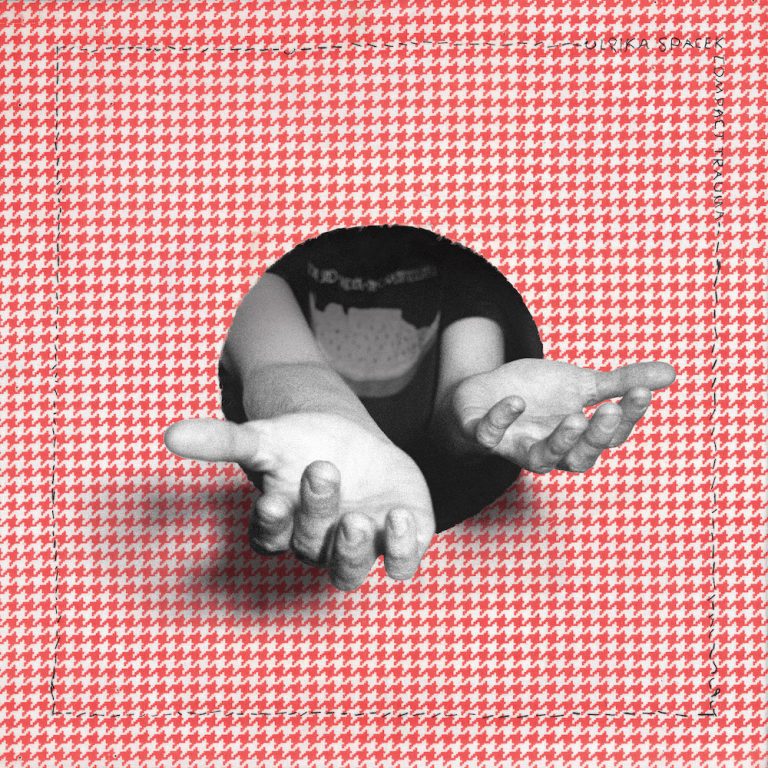To get the whole picture of Ulrika Spacek, the London quintet that lighs up the sky with their flighty genre-mashing rock, one has to take an aerial photograph at the timeline. There’s been several iterations, but the one that comes into focus for the band’s third album Compact Trauma is the clearest, most distinct version.
Beginning as The Enigma Project in the mid-2000s, they evolved into Tripwires, then settled on Ulrika Spacek in 2014, with their debut The Album Paranoia arriving in early 2016. Paranoia was a solid debut, it collected all of the percussive sounds of space-rock and jettisoned them out into woozy psychedelics while still maintaining an alt-rock persona underneath. The band followed it up almost immediately with the also promising but a little less distinct Modern English Decoration in June of 2017.
Little was been heard from them after that, until late 2022 when they returned to the stage and teased of future releases. Five years removed from their last transmission, Compact Trauma is the iridescent follow-up the band needed to stay in the conversation. Unlike their last two outings, Compact Trauma wasn’t recorded at the KEN house in Homerton, London, something the band wasn’t expecting back in 2018 when the process began.
This was just the first in a series of setbacks the band experienced in the coming months – inter-band turmoil reared its ugly head, recording in unfamiliar locations that were inconvenient, and then throw in a global pandemic and it seemed unlikely that Compact Trauma would ever see the light of day. The work was shelved. It was only through perseverance that the band managed to come together through those harrowing years we all experienced and brought forth this snapshot of panic and lament.
If at first it seems like Compact Trauma is entirely a different beast than their last two, it’s because the band are in a completely different headspace for it. The vertical slicing guitars of opener “The Sheer Drop” are enticingly similar to that of Deerhunter or The Strokes even, an admirable comparison. “The Sheer Drop” writhes around like a spastic hose, all the while lead guitarist and vocalist Rhys Edwards asks “Do you ever feel so front loaded? / When the gravity pulls on your medicine?” seemingly a direct response to the closing of their recording space and the start of their woes.
The band intersect several genres, frequently alternating between styles throughout one song. The merging of styles does wonders for Ulrika Spacek’s sound. The lounge-pop of “Accidental Momentary Blur” is interrupted with twangy riffs that spiral into Sonic Youth territory before retracting. The same can be said for “It Will Come Sometime”, which has sprinkles of prickly guitars one moment like a Preoccupations record, then breaks down into melodies that would make Kevin Parker smile.
Now, at this point it seems necessary to point out that Ulrika Spacek aren’t just regurgitating popular bands and styles from the 2010s into some vomitus mass. This is an approach the band firmly own and make their own, heavily aided by Edwards’s cathartic lyrics. On “If the Wheels Are Coming Off, The Wheels Are Coming Off” he reluctantly describes in visual despair his “eyes wide and bleeding feet,” an image that’s hard to shake. The title’s not misleading either, the rails of this vehicle we’re all driving on are someday going to veer off track whether it be via health, poverty, abandonment, it’s all going to end in death.
Edwards is a visual storyteller, sometimes to an unsettling degree. On “It Will Come Sometime” he uses “liver like a lightbulb and swelling” to bridge into the chorus, like an afterthought with no hesitation that those icky visuals might disturb. The anxious energy of “Compact Trauma” is paired with a dim narrative about Edwards (or some fictional narrator perhaps) needing to “take your hands and your head off the table.”
The necessary clarity found on Compact Trauma was the right move for the band, and it’s resulted in their best work to date. The penultimate track, “Stuck at the Door”, is one of the band’s strongest and most intricate compositions so far. At almost 11 minutes, its delirious timeline is full of ups and downs with Edwards matching the speed and intensity throughout. The hazy instrumental that engulfs the majority of the track feels ripped from the cutting room floor from Valium Aggelein’s masterclass in ambient slowcore Black Moon.
The Deerhunter comparison is mostly apt here, and it’s a welcome transition away from the space-rock lining of the last two Ulrika Spacek albums. Deerhunter’s sound is a tough to replicate engine, often genre-less in the face of indie rock circles, but Ulrika Spacek aren’t covering Microcastle or Halcyon Digest, they are simply creating a sound that’s eerily similar but still at its heart original.

